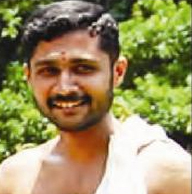Mangaluru, Jul 23: The Kukke Subrahmanya police arrested the priest of Shankhapala Temple in Yenekal in Sullia Taluk on the charge of stealing ornaments offered by the devotees.
 The jurisdictional court handed over the accused to the police custody on Saturday.
The jurisdictional court handed over the accused to the police custody on Saturday.
An official release gave the name of the accused as Murali Venkatesh, son of H. Subrahmanya Bhat, a native of Sullia Taluk, who was presently residing at the temple.
According to a complaint from temple in-charge administrator Monappa, the ornaments including 32 gold finger rings and one gold chain were found missing between February 2 and July 15 from the safe locker of the temple, which is also famous for Ullalthi Bachchanayaka Daiva.
After the complaint was lodged, the priest, along with his family, were absconding and a special police team secured him from Bengaluru, the release said.
The accused priest had pledged some of the valuables at neighbouring villages and had sold some others.




Comments
Did the god not stop him
Naren Kotian, Awaiting for your valuable comment!!!
stealing in their blood. They gets training from RSS in lieng and stealing.
Priest are good in earning money by fooling people.
whenever they get failure to fool people then start stealing ornaments from idols.
They knows that idols doesnt need ornaments.
Kallaru swami ellelluu kallaru....
Add new comment